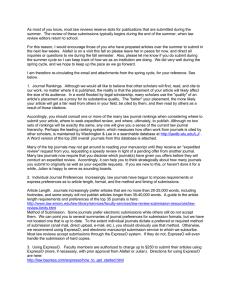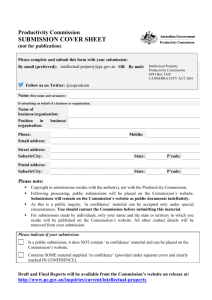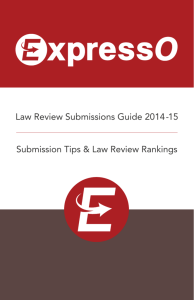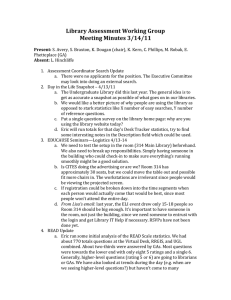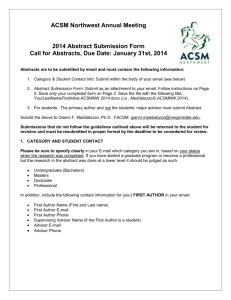Document 11343650
advertisement
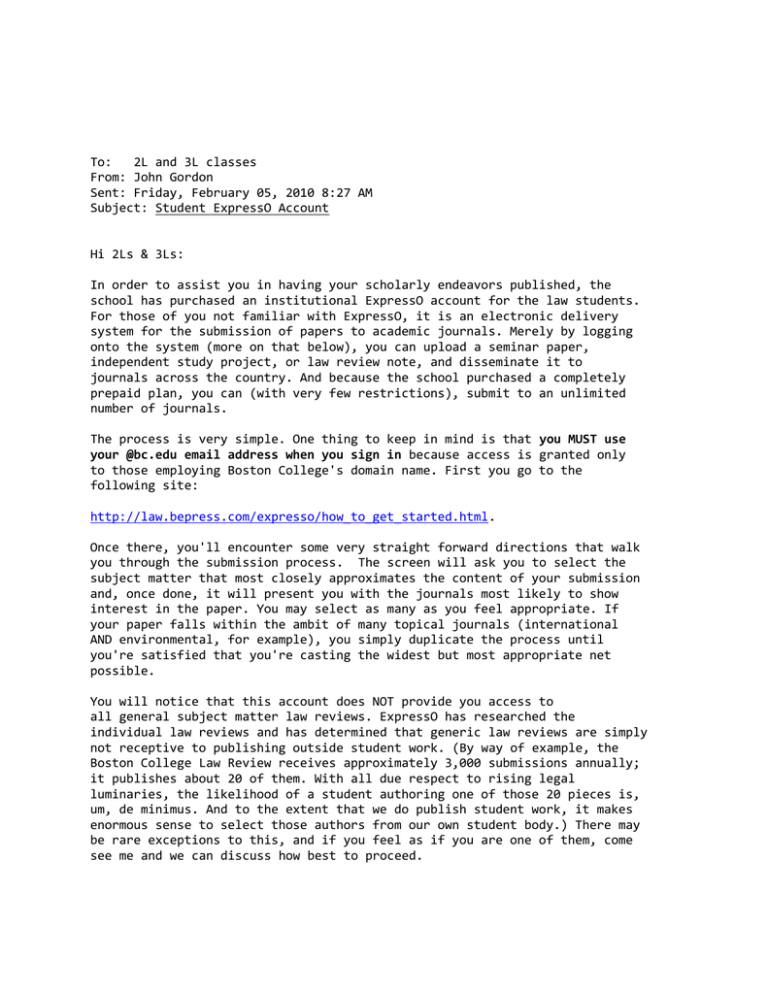
To: 2L and 3L classes From: John Gordon Sent: Friday, February 05, 2010 8:27 AM Subject: Student ExpressO Account Hi 2Ls & 3Ls: In order to assist you in having your scholarly endeavors published, the school has purchased an institutional ExpressO account for the law students. For those of you not familiar with ExpressO, it is an electronic delivery system for the submission of papers to academic journals. Merely by logging onto the system (more on that below), you can upload a seminar paper, independent study project, or law review note, and disseminate it to journals across the country. And because the school purchased a completely prepaid plan, you can (with very few restrictions), submit to an unlimited number of journals. The process is very simple. One thing to keep in mind is that you MUST use your @bc.edu email address when you sign in because access is granted only to those employing Boston College's domain name. First you go to the following site: http://law.bepress.com/expresso/how_to_get_started.html. Once there, you'll encounter some very straight forward directions that walk you through the submission process. The screen will ask you to select the subject matter that most closely approximates the content of your submission and, once done, it will present you with the journals most likely to show interest in the paper. You may select as many as you feel appropriate. If your paper falls within the ambit of many topical journals (international AND environmental, for example), you simply duplicate the process until you're satisfied that you're casting the widest but most appropriate net possible. You will notice that this account does NOT provide you access to all general subject matter law reviews. ExpressO has researched the individual law reviews and has determined that generic law reviews are simply not receptive to publishing outside student work. (By way of example, the Boston College Law Review receives approximately 3,000 submissions annually; it publishes about 20 of them. With all due respect to rising legal luminaries, the likelihood of a student authoring one of those 20 pieces is, um, de minimus. And to the extent that we do publish student work, it makes enormous sense to select those authors from our own student body.) There may be rare exceptions to this, and if you feel as if you are one of them, come see me and we can discuss how best to proceed. Finally, if you wish to add your paper to the law school's repository of scholarly material, click the radial button indicating that you want to forward your paper to NELLCO as well. Wholly apart from the mechanics of uploading your material (which I have little doubt you'll be able to navigate on your own), I have a few suggestions that might optimize your paper's chances of receiving a more thorough evaluation. Submissions without abstracts are at a severe disadvantage when it comes to the selection process. As noted above, reviews are inundated with submissions (and now that electronic submissions are becoming more widespread, the number will only increase). Anything you can do to make the article's subject matter accessible to the evaluators will work to your advantage. You should expend a decent amount of effort, therefore, on crafting a pithy abstract of 150-200 words that captures the paper's content. That abstract should appear both at the beginning of the paper AND in the space allocated for abstracts on the ExpressO submission page. You should also fill in the keyword fields so a specialty journal can search its collection of submissions for those papers that fall within its topic nexus. (Toward that end, I think it's also helpful to have a title that contains the word that actually reflects the paper's topic; if you're writing about insurance law, for example, use the word insurance in the title as opposed to - or in addition to - words such as risk management or actuarial analysis.) Finally, the importance of a cover letter cannot be overestimated. It should contain a sort of abstract of your abstract and explain why the paper is particularly relevant. The cover letter and abstract are your foot in the door; you won't get a serious read if you don't cross that threshold, so it's worth putting some effort into the presentation portion of submissions. (I'm happy to review cover letters and abstracts for anyone who thinks that might be useful.) Remember, now that you are able to use your BC email address for a year after graduation, 3Ls are able to spend some time after the bar polishing their papers and putting them in the best shape possible for submitting. It's not necessary, therefore, to rush a paper onto ExpressO just because your time at the law school is coming to an end. If you have any questions, feel free to contact me. _________________________ John Gordon Office of the Law Review Boston College Law School gordonjo@bc.edu Tel. 617-552-8557
